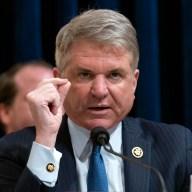“Django Unchained” is a movie so brutal, it brought Quentin Tarantino to tears.
In Toronto earlier this month for the Canadian premiere, he recounted how he broke down during an intense scene where a couple of sadistic slave owners whip Broomhilda (played by Kerry Washington), the wife of the film’s hero Django.
“I was operating the camera on one of those scenes and (Washington) got to me. The next thing you know I was completely blind because my eyepiece was filling up with tears,” he says.
But it was more the context of the brutality than the bloody assault that yanked at Tarantino’s emotions. “That was a rough scene,” he admits. “Where we were doing it, when you see that scene, you will see shacks behind her and those were the actual slave quarters where the slaves lived on those plantations. There is blood in that grass and flesh in those trees and we felt the ancestors who once walked there,” he says.
The Django Unchained that audiences will view when it heads to theaters on December 25 is a toned-down version of the film Tarantino originally offered the American ratings juggernaut MPAA. “They actually gave an R rating to a rougher version than I ultimately ended up presenting to the public,” he says.
It was the director himself who made the call to chill on the violence – even though the gore remains trademark Tarantino and there are plenty of scenes that will churn the stomachs of the strongest viewers. “I could handle a rougher version of the movie than what exists right now. I have more of a tolerance for it, but I kind of realized that when I watched that version of the movie with audiences, that I was traumatizing them too much. It’s just that f—ing simple. And I want people to enjoy the movie at the very end of it.”
Clocking in at just under three hours, there’s plenty to enjoy in Tarantino’s take on the spaghetti western and his homage to Italian director Sergio Corbucci, the man behind the original Django. The film follows Django (Jamie Foxx), a slave-turned-bounty hunter on his quest to free his wife from the evil plantation owner Calvin Candie (Leonardo DiCaprio).
Set in the pre-Civil War south, Tarantino peppers his dialogue with the n— word, substitutes literary references for his typical pop culture banter and offers his heroes lots of moral grey areas in which to roam. “I wasn’t so much trying to get a message across (about slavery) as paint a very realistic picture of what America was like at that time and create a world where slavery is the norm,” he says.
“Rather than make some soapbox speeches about it, or make points against America, I just wanted to … take you back to that time and stick you in the middle of it.”














